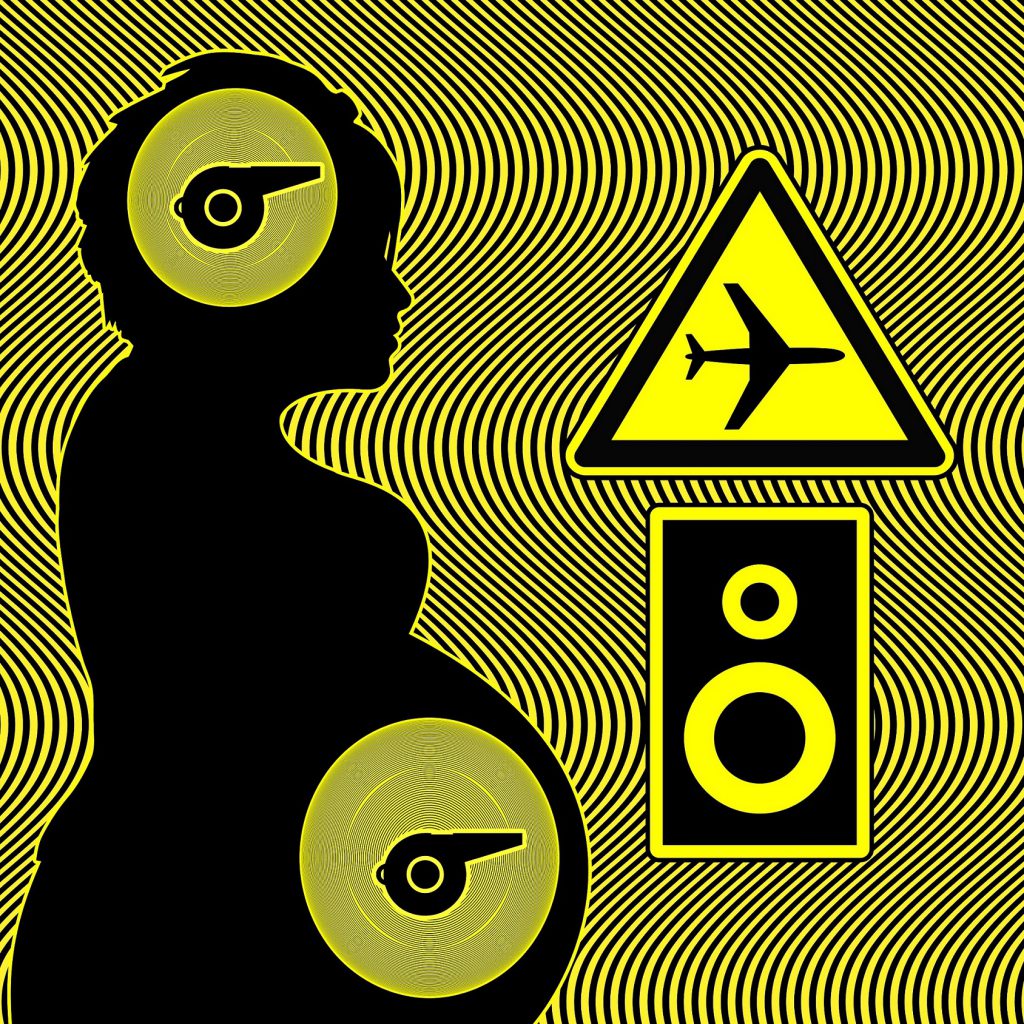
We realize that loud noises may cause stress and hearing loss in grown-ups. Exactly the same may also be true for a baby that is still within the womb. The mother's abdomen, the uterus, and the amniotic fluid assistance to suppress sounds and noises for the fetus; however, constant loud noise, for example earphones placed on your stomach, may contribute to negative effects on the fetus.
Noise levels: Noise is measured using decibels. Noise that is 70 decibels can be annoying to some listener, but 80 decibels is when noise may become damaging to some person's hearing. Hearing is fully developed in the fetus by week 24 of gestation.
Table 1. Noise decibels associated with common sounds
| Breathing | 0-10 decibels | Hearing level |
| Quiet conversation | 50 decibels | Quiet |
| Background music | 60 decibels | |
| Vacuum | 70 decibels | Annoying |
| Typical factory | 80 decibels | Potential for hearing damage |
| Busy urban street | 90 decibels | |
| Jet take-off | 100 decibels | Hearing damage if >1 minute |
| Stereo near human ear | 110 decibels | |
| Loud rock concert | 120 decibels | Max pain level |
| Earphones at loud level | 130 decibels | |
| Exploding firecracker near to human ear | 150 decibels | Eardrum rupture |
Sources of loud noise: You can hear loud noises outside or inside from machines, electronics, cars, or any other people. Some women that are pregnant might even deal with exposure to noise in their workplaces. Numerous studies have evaluated the frequency and results of exposure to noise in neonatal intensive care units (NICUs). Some NICUs have consistently loud noise levels from staff, visitors, and machines that could potentially cause hearing damage in newborns.
- A study in Sweden discovered that daily workplace noise levels >85 decibels when compared with <75 decibels, in women that are pregnant working full-time, increased the chance of hearing difficulties in youngsters.
Effects of loud noise: Exposure to noise can cause stress, increased blood pressure level, and hearing problems in grown-ups. Despite the protective surroundings of the womb, a fetus might be in danger of hearing damage with prolonged contact with loud noises in utero. Potential negative effects related to loud noise exposure in children include hearing damage or hearing problems, stress, sleep disturbances, and learning impairments. The effects of loud noise on fetal health aren't as well studied because the effects in youngsters, teenagers, and adults, but fetal adverse effects are thought to incorporate growth issues and hearing problems.
- A large analysis of 29 small studies discovered that chronic noise during pregnancy did not affect a baby's birth weight or cause preterm birth, birth defects, or death.
- Another analysis of multiple trials discovered that women that are pregnant subjected to consistent sounds levels >80 decibels had a greater risk of developing gestational hypertension along with a higher risk of having small newborns or newborns with birth defects. This study found no links between loud noise and preterm birth or fetal death.
Recommendations: The American Academy of Pediatrics sees that loud noise can be detrimental for a fetus and for children. Different organizations inside the United States publish guidance on appropriate and inappropriate noise levels while pregnant.
Table 2. Recommendations around avoiding fetal and newborn contact with loud noise
| Organization | Guidelines | Recommendations |
| Centers for Disease Control and Prevention | Guidelines for women that are pregnant in noisy workplaces | Avoid noises >115 decibels during pregnancy |
| Sound Group Study | Guidelines for noise within the NICU | Fetus: o Avoid noises >65 decibels during pregnancy o Don't place earphones/headphones on your stomach during pregnancy o Avoid playing music for the baby while he or she is still within the womb Preterm infant: o Avoid hourly continuous sound levels >50 decibels o Avoid hourly noise levels >55 decibels for 10% of the time measured o Max noise levels shouldn't be >70 decibels o Don't use earphones/headphones for infants |

